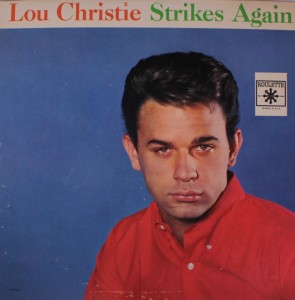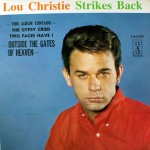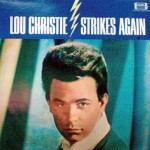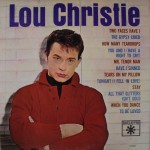I have commented on Christie before though they were earlier comments when this blog was still an email list so they were a little slap dash. To be fair to Lou Christie I should re-vamp what I have said…
Allmusic: "While Lou Christie's shrieking falsetto was among the most distinctive voices in all of pop music, he was also one of the first solo performers of the rock era to compose his own material, generating some of the biggest and most memorable hits of the mid-'60s. Born Lugee Alfredo Giovanni Sacco in Glen Willard, PA on February 19, 1943, he won a scholarship to Moon Township High School as a teen; there he studied music and vocal technique, later joining a group dubbed the Classics. Between 1959 and 1962, in collaboration with a variety of Pittsburgh-area bands, he cut a series of records for small local labels, adopting the stage name Lou Christie along the way. Eventually he made the acquaintance of Twyla Herbert, a classically trained musician and self-proclaimed mystic some 20 years his senior; they became songwriting partners, and in 1962 penned "The Gypsy Cried," which he recorded on two-track in his garage. The single became a local phenomenon, and was eventually licensed for national release by the Roulette label, peaking at number 24 on the pop charts in 1963"
That could be shortened to, Lou could sing like a proverbial bird, was a teen idol and sex symbol and was, perhaps a product of his times.
As I said in an earlier comment on Christie, "he is one of the batch of Italian American singers (real name Lugee Alfredo Giovanni Sacco) who flooded the airways in the late 50s / early 60s …. qv: Frankie Valli, Bobby Darin, Fabian, Frankie Avalon, Dion, Jack Scott, Freddy Cannon, Johnny Rivers, Bobby Rydell, Bob Gaudio, James Darren…"
I can add Connie Francis and Bobby Vee to that list also.
Why so many Italians? Not all the Italians I know can sing … well, not like these guys.
Perhaps economic necessity creates music.
There was time when only (mainly) poor kids where attracted to careers in music. Potential fame and money where a way of escaping from the often predetermined background of being poor (and anonymous) in contemporary America. Their American dream wasn't based around studying hard, going to University and doing well. I don't know if that opportunity even existed for them. I do know that up until the 1960s, outside classical music and perhaps some folk circles music was a career path, albeit a risky one, for the working class of the US. Whether it be the Italians of the 50s and 60s, of New Orleans jazz 50 years earlier, or of New York and New Jersey in the 30s and 40s, of the poor white kids from the South in the 50s , of the poor black kids from the North, of the Poles and other Slavs from Detroit and surrounds, of the Jewish kids from New York or of the Mexican Americans from Texas and Arizona, music provided an escape route from daily tedium and toil, and with a bit of luck, an escape to a career with fame and potential fortune.
Christie was a part of that simple background and Italian heritage …
A history of rock and pop through the eyes of a social historian with a Marxist bent would be interesting if nothing else.
People forget that, art considerations aside, the music business is just that, a business.
Christie had had minor hits since 1963 and was established but had been drafted into the army for two years. When he came out he found huge commercial success with 'Lightning Strikes' (#1, 1965 on the MGM label). In the traditional of all good music companies various labels rushed to cash-in on Christie. Roulette and Colpix both released 1966 collections entitled "Lou Christie Strikes Again" even though neither album had anything to do with the hit song. The Colpix set featured a compilation of previously released 1964-1966 Colpix singles, with a few unreleased tracks whilst the Roulette set has 4 "new" songs added to 8 lifted from Lou's first album, "Lou Christie" on Roulette in 1963.
Are the albums compilations? Well, yeas and no. They are from different sessions and the albums have been compiled together but the material is largely new and such practices were not uncommon before the album became the dominant form for "serious" music*.
To make things more confusing Co & Ce Records released this same album as "Lou Christie Strikes Back" in 1966. Co & Ce was a small Pittsburgh-based record label which was run by Herb Cohen and Nick Cenci from 1962-1967… and who had signed Christie early on (first). His early releases with the Co & Ce were released around Pittsburgh but Roulette picked them up for national distribution. So, now, accordingly, both labels got to or did a deal to release this album with the same art work, same songs but different titles.
Co & Ce, also, had released Christie's 1966 Single "Outside The Gates Of Heaven / All That Glitters Isn't Gold" under their name … I assume that was a response to his success with "Lightning Strikes".
The new tracks were:
- Outside The Gates Of Heaven – (A side # 45 1966 Co & CE records)
- There They Go – ( the flip side to "Stay" on Roulette from 1964)
- Maybe You'll Be There – ( a uncharted Roulette single from 1964)
- You May Be Holding My Baby – (this doesn't seem to have been a single or come from an album so it may be an unreleased track)
The ones lifted from the first album:
- Mr. Tenor Man
- Tears On My Pillow
- The Gypsy Cried
- Have I Sinned
- Two Faces Have I
- How Many Teardrops
- All That Glitters Isn't Gold
- You And I ( Have A Right To Cry )
The tracks are three years old and music had moved on, but by 1966 Lou hadn't changed his style greatly. That would come with his late 60s albums. So these tracks did fit in with his current hit, more or less and, obviously, having been recorded together, earlier, they fit in amongst themselves.
But ultimately it's Christie's voice that wins you over. And, he had two unique voices … he had a pleasing doo-wop-tinged tenor, as well as a full command of a shrieking falsetto. The tenor is easy, the flasetto will test how much you like the falsetto sub genre of pop rock.
Tracks (best in italics)
- Outside The Gates Of Heaven – (Christie, Herbert) – a throw back for sure but quite pleasing with Christie's falsetto in perfect use. I have no idea why everyone is outside the gates of heaven though.
- Mr. Tenor Man – (Carroll Jackson) – I believe this was first recorded by Christie. A response to Johnny Cymbal's "Mr Bass Man" (#16, 1963)
- Tears On My Pillow – (B. Lewis) – first recorded by Little Anthony and the Imperials in 1958 (#4). https://en.wikipedia.org/wiki/Tears_on_My_Pillow
- There They Go – (Jimmy Crane) – first recorded by The Delmonicos in 1963
- The Gypsy Cried – (Herbert, Sacco) – a great track
- Have I Sinned – (Ebert, Mendelsohn) – I don't have any background on this track. This is is falsetto and it's most overused perhaps. All technique no groove.
- Two Faces Have I – (Herbert, Christie) – It may be old but it's good.
- Maybe You'll Be There – (Rube Bloom , S. Gallop) – The song was published in 1947. Gordon Jenkins had a #3 with it in 1948 and The Four Aces had a popular version of it in 1958. https://en.wikipedia.org/wiki/Maybe_You'll_Be_There. Christie does a very good, authentic version in his best ballad style. Though, perhaps, a little to authentic …it's too 1958.
- How Many Teardrops – (Rick Rodell) – written by "Milan the Leather Boy" aka Rick Rodell a rock n roll enigma.
- You May Be Holding My Baby – (Art Russell, Paul Colby) – The Pussycats released a version in 1964. This is a little more progressive and works. There's a nice, strange little backing vocal running through it.
- All That Glitters Isn't Gold – (Herbert, Christie) – filler, perhaps.
- You And I (Have A Right To Cry ) – (Cohen, Lapham, Levy) – The record execs want a piece of the song writing. Cohen was from Co & Ce records and Morris Levy was of Roulette Records and they were friends. Maybe the Lapham wrote the whole song and they got a cut, maybe not. Either way Christie was the first to record the same. A bit to cutesy.
And …
Patchy- the best songs are the ones from the earlier album. Still, I'm keeping it.
Chart Action
US
Singles
1966 Outside The Gates Of Heaven The Billboard Hot 100 #45
1963 The Gypsy Cried The Billboard Hot 100 #24
1963 Two Faces Have I The Billboard Hot 100 #6
1963 Two Faces Have I R&B Singles #11
1963 How Many Teardrops The Billboard Hot 100 #46
Album
—
England
—
Sounds
Outside The Gates Of Heaven
https://www.youtube.com/watch?v=dZsIpYf1meY
mp3 attached
Mr. Tenor Man
https://www.youtube.com/watch?v=BnQruRmmSlE
Tears On My Pillow
https://www.youtube.com/watch?v=6atTQEk8O4A
There They Go
https://www.youtube.com/watch?v=lXd-QyafbT8
The Gypsy Cried
https://www.youtube.com/watch?v=TV4KqcgtyHc
Have I Sinned
https://www.youtube.com/watch?v=TV4KqcgtyHc
Two Faces Have I
https://www.youtube.com/watch?v=w05w1XbZTG8
Maybe You'll Be There
https://www.youtube.com/watch?v=Uls2uru1Nh0
How Many Teardrops
https://www.youtube.com/watch?v=zGJjEAAZX18
You May Be Holding My Baby
https://www.youtube.com/watch?v=MBKX-tKjU-A
All That Glitters Isn't Gold
https://www.youtube.com/watch?v=oh9PCD64NU4
You And I ( Have A Right To Cry)
https://www.youtube.com/watch?v=BNHwJWJW9Pk
Others
https://www.youtube.com/watch?v=NzhuZ4jMnZU
https://www.youtube.com/watch?v=haYvrO5D_Yo
https://www.youtube.com/watch?v=6RFBS8iU39Q
Review
http://www.allmusic.com/album/lou-christie-strikes-again-mw0000836378
https://somerecords.wordpress.com/2008/04/07/lou-christie-lou-christie-strikes-again-1966/
Bio
https://en.wikipedia.org/wiki/Lou_Christie
http://www.allmusic.com/artist/lou-christie-mn0000807121/biography
http://www.authorsden.com/visit/viewShortStory.asp?AuthorID=9014&id=13889
Website
http://louchristiefanclub.com/
https://www.facebook.com/pages/Lou-Christie/109495209070095
Trivia
—
An aside:
*Actually it shits me when people refer to some albums as compilations and somehow they shouldn't be treated as proper "albums". When the wankers at Rolling Stone magazine put out their lists of "best albums" they exclude compilations (oddly though with the exception of Elvis' "Sun Sessions" (1976) which compiles Elvis' Sun output … they wouldn't have credibility otherwise). Pinheads usually say Elvis never pout out a great album (which is rubbish in itself, "Elvis" (1956), "Elvis Presley" (1956), "Elvis is Back" (1960) and "From Elvis in Memphis" (1969) are all classics) but they always leave out "Elvis Golden Records" (1958), "Elvis Golden Records Vol 2" (1959), "Elvis Golden Records Vol 3" (1963) and "Elvis Golden Records Vol 4" (1968). OK only the first two are great but are they compilations? The songs are all hit singles that weren't normally released on albums and were normally recorded at the same sessions and around the same time. Why is that album called a "compilation". How is it comparable to, say, "Queen's Greatest Hits" that collects their best selling tracks, that were singles and on albums, over a 20 year period?. It's not. Those Elvis Greatest Hits albums came from an era when there were albums and then there were singles. A album which has singles released from it comes (mainly, as a concept) from the 60s. To treat those earlier albums as compilations may be true by definition but it is more than a little unfair.




